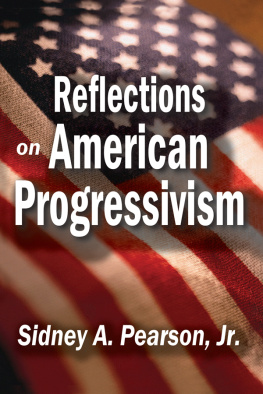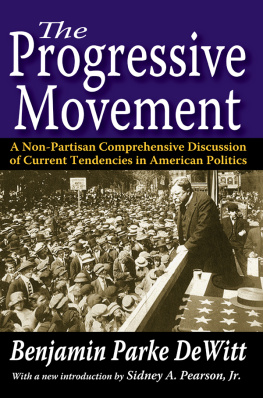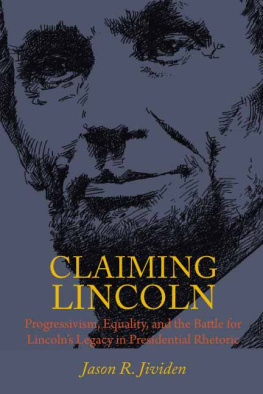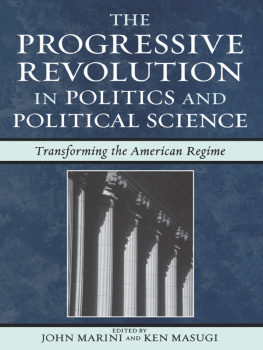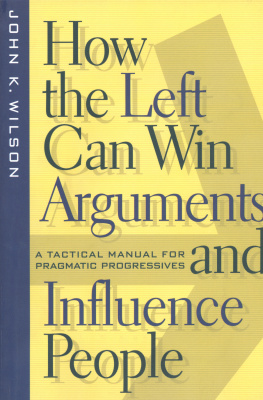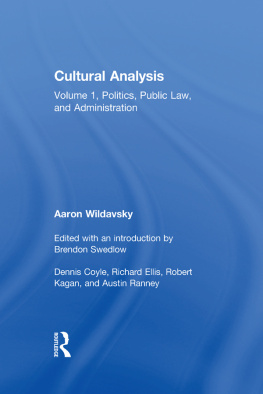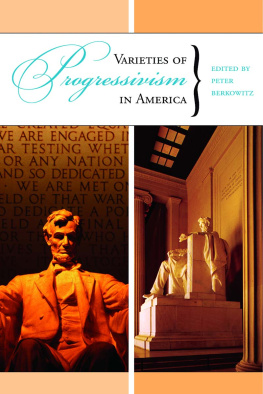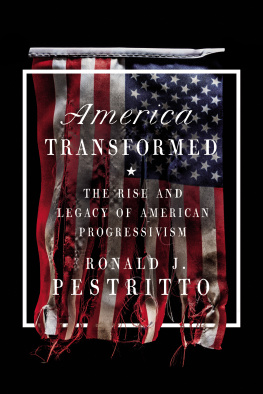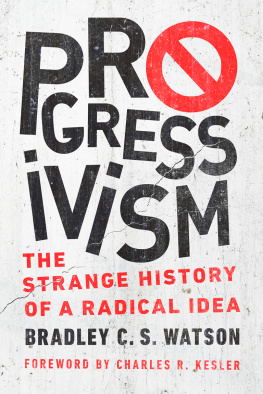First published 2014 by Transaction Publishers
Published 2017 by Routledge
2 Park Square, Milton Park, Abingdon, Oxon OX14 4RN
711 Third Avenue, New York, NY 10017, USA
Routledge is an imprint of the Taylor & Francis Group, an informa business
Copyright 2014 by Taylor & Francis
All rights reserved. No part of this book may be reprinted or reproduced or utilised in any form or by any electronic, mechanical, or other means, now known or hereafter invented, including photocopying and recording, or in any information storage or retrieval system, without permission in writing from the publishers.
Notice:
Product or corporate names may be trademarks or registered trademarks, and are used only for identification and explanation without intent to infringe.
Library of Congress Catalog Number: 2014010756
Library of Congress Cataloging-in-Publication Data
Pearson, Sidney A.
Reflections on American progressivism / Sidney A. Pearson, Jr.
pages cm
Includes bibliographical references and index.
ISBN 978-1-4128-5494-8
1. Progressivism (United States politics) 2. United StatesPolitics
and government. I. Title.
JK275.P376 2014
320.530973dc23
2014010756
ISBN 13: 978-1-4128-5494-8 (hbk)
Yet there is no doubt that statesmen have written more successfully about politics than philosophers; for since experience has been their guide, they have taught nothing that could not be put into practice.
(Spinoza, A Treatise on Politics)
John Dewey observed that a lengthy introduction is a sure sign that the author has a feeling that he has not made himself clear in the text. This introduction is written with the nagging feeling that observation contains more than a gram of truth. The idea of progress in American political thought is a labyrinth. But reflections on American progressivism is a fascinating topic for anyone interested in the course of American political thought since the founding. Thinking out loud about American progressivism, therefore, requires no more justification than making the point that it is an interesting topic followed up with a modicum of curiosity about its nature. Progressivism is, I think, an interesting topic. At the same time it is a sufficiently complex subject of inquiry that a few preliminary remarks are in order, all made with due respect to Dewey.
So powerful is the term progressive in academic circles that grown people retreat from being labeled anti-progressive the way schools of fish retreat from the spreading ink of a squid. To be unprogressive in the modern academy is to be at minimum a reactionary and more likely branded as a closet fascist. For someone like myself, who is skeptical of the progressive mind, I would like to be able to say that I think the progressive era is drawing to a closea victim of its own internal contradictions, both intellectual as well as practical; contradictions I have tried to discuss here. But I also quote Spinoza at the outset because I think he has put his finger on the fundamental problem of why the influence of the progressive intellectual on practical politics is likely to persist. I cannot help but note that Spinozas dictum has been around for well over three hundred years and the problem he pointed out with such pithy precision is still with us; abstract academic speculation seeseems to be one of the constants in politics that is immune to any contrary reality. Further, it has been argued, accurately I think, that while there are no permanent majorities in American politics there are permanent factions.1 Even temporary majorities, if they are sufficiently united, can enact long-lasting changes in public policy. Progressivism seems to be one of those factions. Whether such temporary majorities can permanently change the nature of the regime is an open question. Who knows when Fate is waiting just around the corner with another surprise for both the wary and the unwary alike?
The hold the progressive mind has on the modern academy seems impervious to any counterarguments or narratives. It is most often presented as the opposite of conservative, but this is only partly true. Progressivism is a cathedral of thought, but it is a structure built on a foundation that may not fully support its spires. Thomas Kuhn was no doubt correct, I think, that paradigms persist even in the face of their inability to explain reality until a better paradigm comes along. He might have added that, at least for political science, ideologies persist independent of a superior paradigm. There is much that is wrong with the progressive paradigm, in my opinion, but it is not obvious what would take its place or that counterarguments alone will carry the day. Marxism is a case in point. There was some speculation initially that the demise of Marxism in the old Soviet Union would be the death knell for the ideology of progress; Marxism would henceforth be a subject for historical study and not a living idea. But the idea of progress in the Marxist sense has taken hold in some academic quarters even stronger than during the Cold War; this even as the principles of the American regime were helping to defeat it abroad. The modern idea of historical progress appears to be as strong as ever, albeit in ever changing forms of expression. This has led me to conclude that much of the persistence of the progressive model is rooted in the foundations of American progressivism, which are, of course, in turn rooted in certain strands of European progressivism that came out of the Enlightenment. It is not clear that the idea of progress is in fact rooted in a superior model of political explanation. If it cannot be explained entirely in rational terms, it can at lest be studied in rational terms. Such at least is the interpretation I try to develop here.
What is the character of the progressive challenge to the founding principles of the American regime? One might begin with a number of points, but natural law seems to stand out as the core issue in any discussion of progressives. Natural law, much like divine law, is by definition a law outside of the reach of human law and progressives could no more easily tolerate a power outside of their own control than they could tolerate any restraints on their own exercise of power. Progressives have tended to think of themselves as pragmatists in politics, but the foundations of progressivism tell a different story. Progressives introduced a foundational skepticism into the study of the founding principles of the American regime that is, in practice, very much indistinguishable from nihilism, John Deweys well-known defense of pragmatism to the contrary notwithstanding. As an exercise in pragmatism, American progressivism does not seem to me to correspond to what we ordinarily think of as pragmatism; a matter-of-fact treatment of things that treats things in terms of their immediate practical consequences. This makes the study of the origins of American progressivism a subject that speaks to its own importance and there seems to me no need to belabor this point. At the level of theoretical analysis, the issue is who has the intellectual and moral authority to interpret the nature of the American regime, the founders or the progressives? It may be possible to imagine some sort of practical accommodation between the two, but at the theoretical level I seriously doubt that such an accommodation is possible. To the extent that theory drives practice, the opposition between the two appears to be a permanent source of fundamental conflict in American politics because it is a conflict rooted in regime principles and not in particular policies. The progressive critique of the American regime is a critique of the founding principles of the regime.

